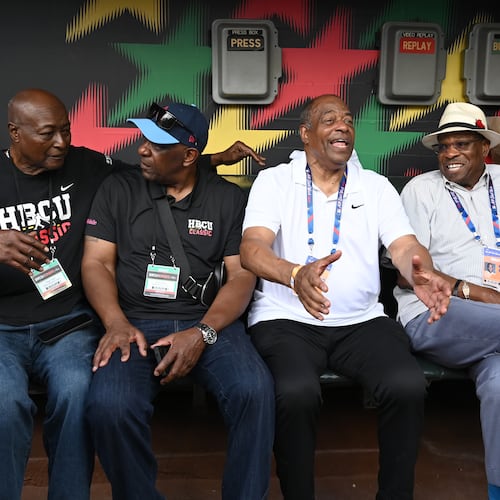The Braves may have found the next Aroldis Chapman in rookie right-hander Mauricio Cabrera.
The 22-year-old Cabrera has excelled since he was called up to Atlanta on June 27. Since that time, he has made 15 appearances with two saves and a 2.70 ERA. He notched his second career victory in Atlanta’s 2-1 win over the Phillies on Sunday.
Cabrera is connected to the Cubs’ closer because of their overpowering fastballs. The duo are the only two pitchers that make up Major League Baseball’s 50 fastest pitches thrown in 2016, and both have fastballs that possess a 100.6 mph average velocity.
“I’m proud to get the comparison to Aroldis, but to me I never focus on the velocity of the fastball,” Cabrera said via an interpreter. “I’m not trying to throw it as hard as I can. I’m always focusing on location. I’ll leave the comparisons up to the fans.”
Cabrera’s ascension to Atlanta isn’t exactly ordinary. He wasn’t among the team’s top prospects at the time he was called up. He posted decent numbers in Mississippi this year, but his previous five seasons in the Braves’ farm system left much to be desired. Before the 2016 season, The 6-foot-3, 245-pound Cabrera had a 9-19 record in the minors.
Things have just clicked since he reached the major leagues. He debuted the day he was called up, throwing one inning of relief and allowing only one hit. It turned out to be the start of a trend, as Cabrera continued to handle pesky hitters with relative ease. He’s only allowed more than one earned run in an appearance once, when he gave up three runs in hitter-friendly Coors Field on July 21.
Cabrera attributes his solid start to sticking with the same habits on the mound that he used back in Mississippi, and Peoria, and Carolina before that.
“I never felt like it took a while to get comfortable,” Cabrera said. “Once I got the call to the big leagues, I’ve tried to maintain the same approach, the same attitude and the same outlook.”
His relaxed nature on the mound may also be a product of pedigree. Cabrera’s older brother, Alberto, was a pitcher in the Cubs’ and Tigers’ organizations. He appeared in 32 games with Chicago in 2012 and 2013 but spent the other 10 seasons of his professional career in the minor leagues.
Cabrera said he’s worked very closely with his brother to make it to the big leagues and stick around for awhile.
“Last year, he and I worked a lot on mechanics and trying to locate my fastball, which has been a big help,” Cabrera said. “I’m very grateful for all his advice and all the help he’s given me.”
Whatever it was that got Cabrera to this moment has lasting power. He had the fourth-lowest ERA among Braves’ relievers in July, which is a good sign since he’s becoming a known commodity.
His pitching in the Phillies’ series finale Sunday was another ho-hum effort to add to his growing collection. Cabrera came into the 0-0 game in the top of the 7th inning and registered a strikeout and two flyouts to stump the Phillies’ offense.
While Snitker hesitated to say Cabrera has exceeded expectations, he didn’t hide that he’s liked what he’s seen from one of his newest pitchers.
“I knew him as a young kid with a big arm,” Snitker said. “I don’t think you ever know what to expect when you bring them up. He’s been really good because he’s had some high-leverage situations and he’s performing.”
The rest of the Braves’ 2016 season can be a valuable test for Cabrera. He’s an important piece in the team’s bullpen now with Arodys Vizcaino recovering from injury and later since he’s only 22. He said he wants to work on his slider the rest of this season so it can effectively compliment his fastball and changeup.
Cabrera has come on the scene in Atlanta after being a relative unknown in the team’s farm system. He still has to prove himself past one month of play, but he’s in the midst of a fast track from Mississippi to a must-have with the Braves going forward.
After all, a triple-digit heater changes even the best of plans.
About the Author
Keep Reading
The Latest
Featured


